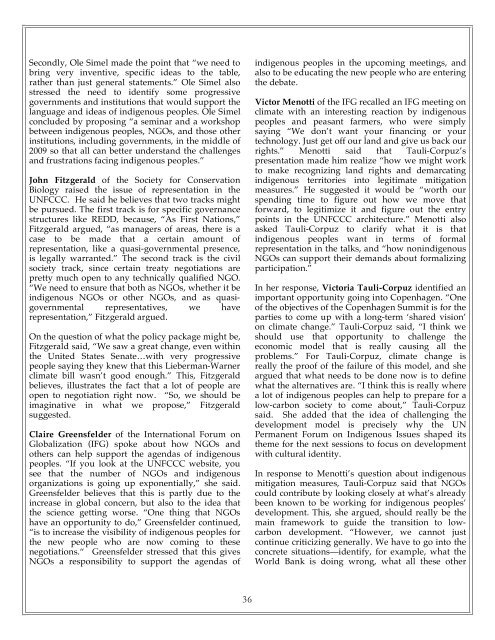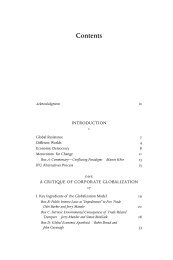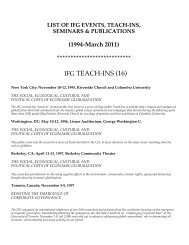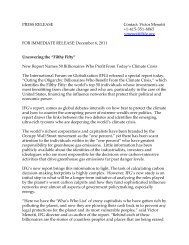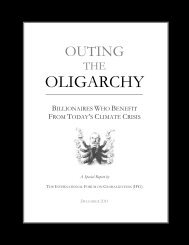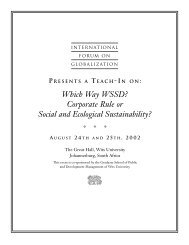UNDRIP Report - English FINAL - International Forum on Globalization
UNDRIP Report - English FINAL - International Forum on Globalization
UNDRIP Report - English FINAL - International Forum on Globalization
Create successful ePaper yourself
Turn your PDF publications into a flip-book with our unique Google optimized e-Paper software.
Sec<strong>on</strong>dly, Ole Simel made the point that “we need to<br />
bring very inventive, specific ideas to the table,<br />
rather than just general statements.” Ole Simel also<br />
stressed the need to identify some progressive<br />
governments and instituti<strong>on</strong>s that would support the<br />
language and ideas of indigenous peoples. Ole Simel<br />
c<strong>on</strong>cluded by proposing “a seminar and a workshop<br />
between indigenous peoples, NGOs, and those other<br />
instituti<strong>on</strong>s, including governments, in the middle of<br />
2009 so that all can better understand the challenges<br />
and frustrati<strong>on</strong>s facing indigenous peoples.”<br />
John Fitzgerald of the Society for C<strong>on</strong>servati<strong>on</strong><br />
Biology raised the issue of representati<strong>on</strong> in the<br />
UNFCCC. He said he believes that two tracks might<br />
be pursued. The first track is for specific governance<br />
structures like REDD, because, “As First Nati<strong>on</strong>s,”<br />
Fitzgerald argued, “as managers of areas, there is a<br />
case to be made that a certain amount of<br />
representati<strong>on</strong>, like a quasi-governmental presence,<br />
is legally warranted.” The sec<strong>on</strong>d track is the civil<br />
society track, since certain treaty negotiati<strong>on</strong>s are<br />
pretty much open to any technically qualified NGO.<br />
“We need to ensure that both as NGOs, whether it be<br />
indigenous NGOs or other NGOs, and as quasigovernmental<br />
representatives, we have<br />
representati<strong>on</strong>,” Fitzgerald argued.<br />
On the questi<strong>on</strong> of what the policy package might be,<br />
Fitzgerald said, “We saw a great change, even within<br />
the United States Senate…with very progressive<br />
people saying they knew that this Lieberman-Warner<br />
climate bill wasn’t good enough.” This, Fitzgerald<br />
believes, illustrates the fact that a lot of people are<br />
open to negotiati<strong>on</strong> right now. “So, we should be<br />
imaginative in what we propose,” Fitzgerald<br />
suggested.<br />
Claire Greensfelder of the <str<strong>on</strong>g>Internati<strong>on</strong>al</str<strong>on</strong>g> <str<strong>on</strong>g>Forum</str<strong>on</strong>g> <strong>on</strong><br />
Globalizati<strong>on</strong> (IFG) spoke about how NGOs and<br />
others can help support the agendas of indigenous<br />
peoples. “If you look at the UNFCCC website, you<br />
see that the number of NGOs and indigenous<br />
organizati<strong>on</strong>s is going up exp<strong>on</strong>entially,” she said.<br />
Greensfelder believes that this is partly due to the<br />
increase in global c<strong>on</strong>cern, but also to the idea that<br />
the science getting worse. “One thing that NGOs<br />
have an opportunity to do,” Greensfelder c<strong>on</strong>tinued,<br />
“is to increase the visibility of indigenous peoples for<br />
the new people who are now coming to these<br />
negotiati<strong>on</strong>s.“ Greensfelder stressed that this gives<br />
NGOs a resp<strong>on</strong>sibility to support the agendas of<br />
indigenous peoples in the upcoming meetings, and<br />
also to be educating the new people who are entering<br />
the debate.<br />
Victor Menotti of the IFG recalled an IFG meeting <strong>on</strong><br />
climate with an interesting reacti<strong>on</strong> by indigenous<br />
peoples and peasant farmers, who were simply<br />
saying “We d<strong>on</strong>’t want your financing or your<br />
technology. Just get off our land and give us back our<br />
rights.” Menotti said that Tauli-Corpuz’s<br />
presentati<strong>on</strong> made him realize “how we might work<br />
to make recognizing land rights and demarcating<br />
indigenous territories into legitimate mitigati<strong>on</strong><br />
measures.” He suggested it would be “worth our<br />
spending time to figure out how we move that<br />
forward, to legitimize it and figure out the entry<br />
points in the UNFCCC architecture.” Menotti also<br />
asked Tauli-Corpuz to clarify what it is that<br />
indigenous peoples want in terms of formal<br />
representati<strong>on</strong> in the talks, and “how n<strong>on</strong>indigenous<br />
NGOs can support their demands about formalizing<br />
participati<strong>on</strong>.”<br />
In her resp<strong>on</strong>se, Victoria Tauli-Corpuz identified an<br />
important opportunity going into Copenhagen. “One<br />
of the objectives of the Copenhagen Summit is for the<br />
parties to come up with a l<strong>on</strong>g-term ‘shared visi<strong>on</strong>’<br />
<strong>on</strong> climate change.” Tauli-Corpuz said, “I think we<br />
should use that opportunity to challenge the<br />
ec<strong>on</strong>omic model that is really causing all the<br />
problems.” For Tauli-Corpuz, climate change is<br />
really the proof of the failure of this model, and she<br />
argued that what needs to be d<strong>on</strong>e now is to define<br />
what the alternatives are. “I think this is really where<br />
a lot of indigenous peoples can help to prepare for a<br />
low-carb<strong>on</strong> society to come about,” Tauli-Corpuz<br />
said. She added that the idea of challenging the<br />
development model is precisely why the UN<br />
Permanent <str<strong>on</strong>g>Forum</str<strong>on</strong>g> <strong>on</strong> Indigenous Issues shaped its<br />
theme for the next sessi<strong>on</strong>s to focus <strong>on</strong> development<br />
with cultural identity.<br />
In resp<strong>on</strong>se to Menotti’s questi<strong>on</strong> about indigenous<br />
mitigati<strong>on</strong> measures, Tauli-Corpuz said that NGOs<br />
could c<strong>on</strong>tribute by looking closely at what’s already<br />
been known to be working for indigenous peoples’<br />
development. This, she argued, should really be the<br />
main framework to guide the transiti<strong>on</strong> to lowcarb<strong>on</strong><br />
development. “However, we cannot just<br />
c<strong>on</strong>tinue criticizing generally. We have to go into the<br />
c<strong>on</strong>crete situati<strong>on</strong>s—identify, for example, what the<br />
World Bank is doing wr<strong>on</strong>g, what all these other<br />
36


